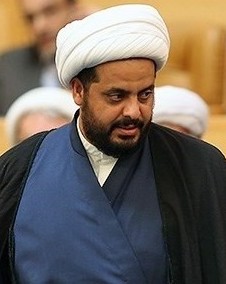Qais Khazali
Pro-Iran Iraqi insurgent From Wikipedia, the free encyclopedia
Qais Hadi Sayed Hasan al-Khazali (Arabic: قيس هادي سيد حسن الخزعلي; born 20 June 1974) is an Iraqi politician and militant leader who is the founder and Secretary-General of the Asa'ib Ahl al-Haq, an Iraqi Shi'ite paramilitary organization and political party. He is best known as the founder and leader of the Iran-backed Special Groups in Iraq from June 2006 until his capture by British forces in March 2007.[1] As head of the Special Groups, Khazali directed arms shipment, formation of squads to participate in fighting, and insurgent operations, most notably the 20 January 2007 attack on American forces in Karbala.[2] A former follower of Muqtada al-Sadr, he was expelled from the Mahdi Army in 2004 for giving "unauthorized orders" and founded his own group: Asa'ib Ahl al-Haq (AAH) also known as the "Khazali Network" that was later designated as a terrorist group by the U.S. Department of State. During his incarceration, Akram al-Kaabi became acting commander of the organization until his release in January 2010.[3]
Qais Khazali | |
|---|---|
قيس الخزعلي | |
 Qais al-Khazali | |
| Secretary-General of Asa'ib Ahl al-Haq | |
| Assumed office July 2006 | |
| Head of Parliamentary Bloc | |
| Assumed office 2014 | |
| Personal details | |
| Born | 20 June 1974 Sadr City, Ba'athist Iraq |
| Political party | Asa'ib Ahl al-Haq |
| Other political affiliations | Fatah Alliance Sadrist Movement (until 2006) |
| Military service | |
| Allegiance | Iraq |
| Branch/service | Popular Mobilization Forces (until 2020) Islamic Resistance in Iraq (since 2020) |
| Years of service | 2003–present |
| Rank | Commander |
| Unit | Asa'ib Ahl al-Haq Mahdi Army (2003–2006) |
| Battles/wars | Iraq War Syrian Civil War War in Iraq (2013–2017) |
Arrest and release
On the night of 20 March 2007 G squadron of the British SAS raided a house in Basra containing Khazali and arrested him along with his brother and his Lebanese advisor without casualties and gained valuable intelligence.[4]
Khazali was released in January 2010, in exchange for Peter Moore, who had been kidnapped by Asa'ib Ahl al-Haq.[5] In December that year, notorious special groups commanders Abu Deraa and Mustafa al-Sheibani were allowed to return to Iraq and declared they would be working with Khazali after their return.[6] Since his release, al-Khazali has pivoted from attacking U.S.-led Coalition forces in Iraq to recruiting for pro-Assad Shi'ite militias in Syria.[7]
Sanctions
On 6 December 2019, the U.S. Treasury Department sanctioned Khazali and placed him on the SDN List for "involvement in serious human rights abuse in Iraq,"[8][9] and addressed his role in the violent repression of Iraqi protests beginning in October 2019. During the protests, AAH militia forces controlled by Khazali, opened fire on and killed peaceful protesters.[10]
On 31 December 2019, U.S. Secretary of State Mike Pompeo named Khazali, along with Abu Mahdi al-Muhandis, Hadi al-Amiri, and Falih Al-Fayyadh, as responsible for the attack on the United States embassy in Baghdad.[11]
On 3 January 2020, U.S. Department of State designated Asa'ib Ahl al-Haq as a foreign terrorist organization (FTO), with Qais al-Khazali and his brother Laith al-Khazali as Specially Designated Global Terrorists (SDGT) under Executive Order 13224.[12][13]
Notes
Sources
External links
Wikiwand - on
Seamless Wikipedia browsing. On steroids.
